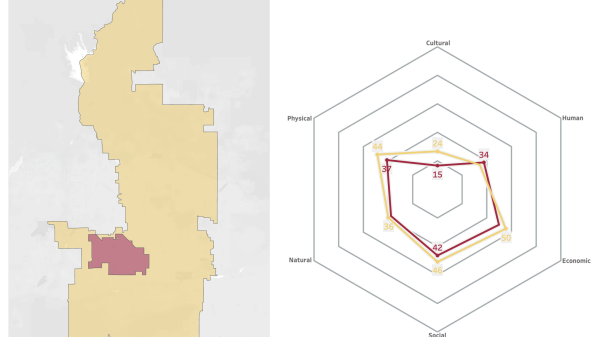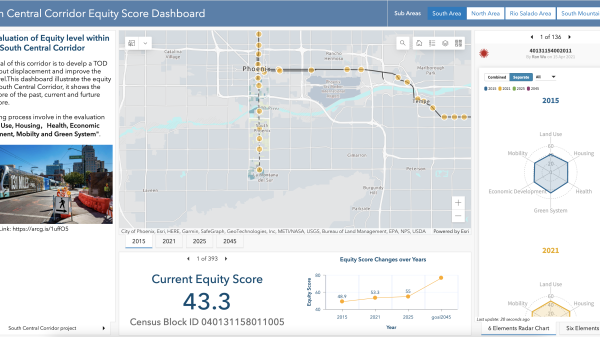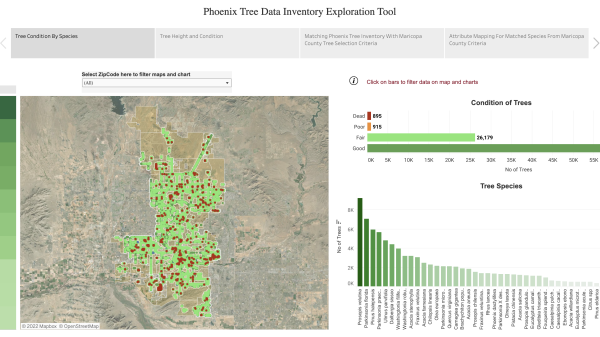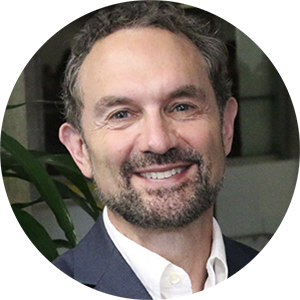
Transcending silos to advance community resilience
Mark Roseland, ASU School of Community Resources and Development
"This is incredible! I spent some time playing with it today, it was so easy to use. Thank you!"
— City of Phoenix staff member
Background
Advancing community resilience requires alignment on a range of intersecting social, economic, and environmental issues and concerns. For example, health disparities stem from intertwined social, cultural, political, and environmental challenges. Conceptual and organizational silos hinder our ability to see these intersections, often resulting in false trade-offs (for example, between environmental and economic objectives) and/or missed opportunities to identify synergies and co-benefits. We need to advance beyond taking “one step forward and two steps backward.” How can we align our efforts to take two steps forward?
Research questions
-
What is the potential of a community resilience decision-support dashboard tool, both at the community level and at the program level?
-
How can the data collection and curation process be automated in order to make the tool readily usable for lay users?
-
How can we provide a mechanism for continued support and development of the tool?
Methods and findings
This project has evolved in several phases in Maricopa County. The first phase was creating a resilience decision support dashboard for the Maryvale neighborhood of Phoenix using an asset-based “community capital” framework (see example 1 image) encompassing natural, physical, economic, human, social and cultural capital.
The second phase was working with the City of Phoenix and a citizen advisory committee on the South Central Corridor Light Rail Extension to create an equitable Transit-Oriented Development (eTOD) tool (see example 2 image) to help guide development around the 11 new corridor light rail stations without exacerbating gentrification of those areas and displacement of current residents. Instead of “capitals” we used Phoenix’s stated priorities of land use, housing, health, green systems, economic development, and mobility.
The current KER Fellowship phase aims to build out the natural capital dimensions of the tool. While we anticipated focusing on heat and air quality metrics, after consultation with city staff from the cities of Phoenix, Scottsdale, and Tempe, the direction was changed to tree cover and urban forestry. We organized a workshop with ten representatives from the three cities, hosted by the ASU Sustainable Cities Network. Based on the workshop and discussion with subject matter experts, the project's focus changed to measuring urban forestry and tree cover in Phoenix, Tempe, and Scottsdale. The first version of the dashboard pilot (see example 3 image) was reviewed and shared with city representatives from Scottsdale, Phoenix, and Tempe. The second version of the pilot dashboard is now being created and shared with the city representatives to help bridge the community and program levels while aiding in day-to-day decision-making.
As we work toward building out the complete tool, we hope the next phase will focus on cultural and creative capital metrics so they can be presented alongside economic ones to make values choices clear. Omitting cultural capital metrics fuels inattention to historic and present harm from dehumanizing racial, social, and environmental injustices. Building a shared vision and collective action toward a more equitable and just future requires that cultural and creative assets of communities become much more prominent in policymakers’ deliberations.
The KER Fellowship project provided clear proof of concept that we can create a tool that helps users generate new strategic options for upstream action and resource investment to better achieve co-benefits and collective impact. We continue to seek support to fully develop the complete tool.
Partners
-
City of Phoenix
-
City of Tempe
-
City of Scottsdale
-
Rob and Melani Walton Sustainability Solutions Service
-
Sustainable Cities Network
-
Design Studio for Community Solutions
Impact
This project is developing a decision-support dashboard tool for Arizona cities and neighborhoods that can be scaled across communities in the US and beyond. It will refine and prototype a conceptual framework and actionable tool that makes trade-offs clear, encourages alignment across stakeholders, and generates new strategic options for upstream action and resource investment to better achieve co-benefits and collective impact.
Deliverables
The Maryvale project was created as a StoryMap and can be seen here. Created in 2020, the technology and our capacity has improved immensely since then.
The South Central Corridor eTOD tool uses an ArcGIS platform and can be seen here. Completed in 2021 this version of the tool is much more sophisticated than the Maryvale version.
For Phoenix, the 2022 pilot dashboard tool was created on the Tableau platform with support from KER staff, the Rob and Melani Walton Sustainability Solutions Service, and the ASU Sustainable Cities Network. The tool allows users to visually and graphically understand tree condition by species; tree height and condition; trees that match with the Maricopa County Tree Selection Criteria; and attributes of the trees that match. Each of these categories can be viewed more closely by examining specific zip codes or the users can guide themselves around the city. Tempe also has in-depth tree canopy and urban forestry data, so with additional support the tool could be developed for Tempe much like the Phoenix version. Scottsdale did not have sufficient tree data at the time so we acquired it from a third party to demonstrate the potential of the tool for Scottsdale.
Mark Roseland
Professor
ASU School of Community Resources and Development
Academic Fellow, 2022
Mark Roseland is professor and past director of the School of Community Resources and Development at Arizona State University, and senior sustainability scientist with the Julie Ann Wrigley Global Institute of Sustainability and Innovation at ASU. A highly regarded thought leader, Professor Roseland lectures internationally and advises communities and governments on sustainable development policy and planning. He is currently working on the 5th edition of his best-selling book Toward Sustainable Communities: Solutions for Citizens and Their Governments.



